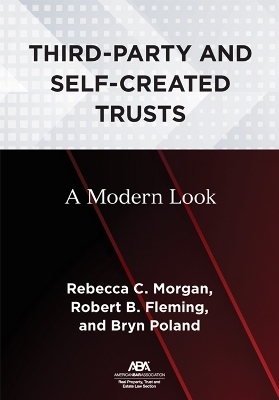
Third-Party and Self-Created Trusts
American Bar Association (Verlag)
978-1-63905-269-1 (ISBN)
Third-Party and Self-Created Trusts includes sample forms and language reflecting the most current rulings, dozens of real-world examples, and detailed endnotes that will help you:
Draft trusts for individuals who have disabled children or elderly or disabled parents so that the trust beneficiary is not disqualified from receiving government entitlement programs
Outline the necessary case law and language that should be considered when drafting wills and trusts for such clients
Include language in the trust for disabled clients who may be receiving Medicaid and wish to retain a supplemental fund for themselves until their death.
In addition to updating the material from the earlier editions, the trust forms have been amended where appropriate.
Rebecca C. Morgan Boston Asset Management Chair in Elder Law, Center for Excellence in Elder Law B.S.B.A., Central Missouri State University J.D., Stetson University Courses: Aging and the Law (J.D. and LL.M. courses), Elder Law, Trusts and Estates, Disability Law Rebecca C. Morgan is the Boston Asset Management Chair in Elder Law. Professor Morgan teaches a variety of elder law courses in the J.D. and LL.M. programs and oversees the elder law concentration program for J.D. students. She is the successor co-author of Matthew Bender's Tax, Estate and Financial Planning for the Elderly, and its companion forms book (Lexis), a co-author of Representing the Elderly in Florida, (Lexis), The Fundamentals of Special Needs Trusts (Lexis), Ethics in an Elder Law Practice (ABA) and Planning for Disability (Bloomberg BNA Portfolio) and co-author of Elder Law in Context (casebook, forthcoming Aspen). She is a member of the elder law editorial board for Matthew Bender. Professor Morgan has authored a number of articles on a variety of elder law issues and has spoken a number of times on subjects of elder law. She is the co-editor of the Elder Law Prof Blog, http://lawprofessors.typepad.com/elder_law/ (with Katherine Pearson (Penn State)). Professor Morgan is a past president of the National Academy of Elder Law Attorneys, past president of the board of directors of the National Senior Citizens Law Center, past chair of the American Association of Law Schools Section on Aging and the Law and of the Florida Bar Elder Law Section, and on the faculty of the National Judicial College. She served as the reporter for the Uniform Guardianship and Protective Proceedings Act. She served on the Florida Attorney General's Task Force on Elder Abuse and the Florida Legislative Guardianship Study Commission. She is a member of the American Law Institute (ALI), academic advisory board for the Borchard Center for Law and Aging, an academic fellow of the American College of Trusts & Estates Counsel (ACTEC), a NAELA fellow, and a member of NAELA's Council of Advanced Practitioners (chair 2012-2014). After a term on the Board of the ABA Commission on Law and Aging, she is a special advisor to the ABA Commission on Law and Aging. She is a member of the board of directors for the Center for Medicare Advocacy. Professor Morgan was the recipient of the 2003 Faculty Award on Professionalism from the Florida Supreme Court Commission on Professionalism. She received the NAELA Unaward in November 2004 from President Stu Zimring for her accomplishments in the field of elder law. Professor Morgan, along with Professor Roberta Flowers, received the 2005 Project Award on Professionalism from the Florida Supreme Court Commission on Professionalism for their video series on ethics in an elder law practice. She received the 2006 Rosalie Wolf Memorial Elder Abuse Prevention Award from the National Committee for the Prevention of Elder Abuse. She received the Homer & Dolly Hand Award for Faculty Scholarship in May of 2008, and the NAELA President's Award from NAELA President Mark Shalloway in May of 2008. She received the Theresa Award from the Theresa Alexandra Foundation in 2008. Professor Morgan was the 2009 recipient of the Treat award from the National College of Probate Judges. She currently lives in Gulfport, Florida. Phone: 727-562-7872 | Email: morgan@law.stetson.edu | Office: Elder Law (Gulfport) Robert B. Fleming is a partner in the Tucson elder law firm of Fleming & Curti, P.L.C., with a practice limited to trust (and special needs trust) administration, guardianship, conservatorship, estate planning, and probate. Mr. Fleming was the original author of The Elder Law Answer Book, and co-author (with the late Professor Kenney Hegland) of New Times, New Challenges: Law and Advice for Savvy Seniors and Their Families. He is certified as an Estate and Trust specialist by the State Bar of Arizona, and as a Certified Elder Law Attorney (CELA) by the National Elder Law Foundation. Mr. Fleming is a founding member of the Special Needs Alliance (https://www.specialneeds alliance.org/). He has lived in (and is passionate about) downtown Tucson, Arizona (a UNESCO International City of Gastronomy), for more than four decades. Ms. Poland is partner at the law firm Mayo & Poland, PLLC, in Baytown, Texas. She focuses her practice on special needs trust planning and administration, Medicaid planning, and qualified settlement funds. Born and raised a Kansas girl, Ms. Poland was inspired to become an elder law attorney when she watched her family struggle with care options for her great-grandmother, Lulu Sleeper, who lived to the age of 109. Ms. Poland is a member of, and has served in various leadership roles for, the Houston Bar Association, the Texas Chapter of the National Academy of Elder Law Attorneys, and the Special Needs Alliance. When Ms. Poland is not helping clients, she loves taking family adventures with her husband and their twin daughters and young son.
TABLE OF CONTENTS
Acknowledgments ix
About the Authors xi
CHAPTER 1
Introduction of Planning for Special Needs with Trusts 1
I.Demographics 1
A.The Costs of Long-Term Care 3
B.Why Plan to Become Eligible for Public Benefits? 3
II.History of Trust Planning 4
A.Early Trust Practice (No Holds Barred) 4
B.MQT 6
C.OBRA ’93 8
D.Medicaid Trusts 11
III.Distinctions between Self-Settled and Third-Party Trusts 11
A.When Can a Self-Settled Trust Actually Be
a Third-Party Trust? 12
IV.Examples of Various Public Benefits Programs 13
V.SNT Requirements Summary 15
VI.Vocabulary 15
CHAPTER 2
Ethical Issues and Fiduciary Representation 17
I.Introduction 17
II.Who Is the Client? 17
A.First-Party Trusts: Is the Question, “Who Is the Client?”
More Complicated? 19
B.Third-Party SNTs: Is the Question, “Who Is the Client?”
Easier to Answer? 21
III.When an Attorney Represents the Trustee:
The Ethical Issues 22
IV.When the Attorney Is the Trustee (or Other Fiduciary) 27
V.Does the Attorney for the Trustee Have Any Duty
or Liability to the Trust Beneficiary? 28
VI.Ability to Share Information with Nonclient Beneficiary 32
A.What about Privileged Information? Is That Protected
from Disclosure? 34
VII.Always an Attorney Must Be Competent 36
VIII.Conclusion 37
CHAPTER 3
Public Benefits 39
I.Introduction 39
II.Various Programs 39
A.Supplemental Security Income 39
B.SSDI 50
III.Childhood Disability Benefits: Transitioning from SSI to SSDI 60
A.Description of Programs 61
B.Eligibility Requirements 62
C.Proving Disability 62
D.Medicare 64
E.Medicaid 65
F.Tips and Tricks 66
IV.Federal Housing Programs under the U.S. Department of Housing and Urban Development 67
A.Description of Programs 67
B.Eligibility Rules 68
C.Tips and Tricks 72
CHAPTER 4
First-Party Special Needs Trusts 77
I.Introduction 77
II.The Statutes and More 78
III.The Program Operations Manual System 81
IV.The State’s Medicaid Program 81
V.The State’s Trust Code 81
VI.Commentary 82
VII.The Trust Is Irrevocable 84
VIII.Sole Benefit 85
IX.Source of Funds 86
X.Distribution Standard 88
XI.What Are “Special Needs”? 89
XII.Some Specific Trust Provisions 89
XIII.Submitting the SNT to the SSA for Approval 91
XIV.Who Should Be the Trustee? 91
XV.Case Law 92
XVI.Creation 93
XVII.Payback Requirements 95
XVIII.Administrative Matters 96
XIX.Spousal and Child Support 97
CHAPTER 5
Third-Party Special Needs Trusts 99
I.Introduction 99
II.What Is a Discretionary Trust? 100
III.Distinctions of a Third-Party SNT from the First-Party SNT 104
A.Why a Third-Party SNT? 104
B.Who Is a Third Party? 109
vi Table of Contents
IV.Uniform Trust Code 110
V.Inter Vivos or Testamentary? 114
VI.Distribution Standard 116
VII.Modification 124
VIII.What the Courts Have to Say 126
CHAPTER 6
Modification, Reformation, Decanting, and Directed Trusts 131
I.Introduction 131
II.Modification 131
A.Guidance from the Program Operations Manual System 134
B.Modification: Applicability to Special Needs Trusts 134
III.Reformation 142
IV.Decanting 144
A.Uniform Trust Decanting Act 145
B.State Example: Florida’s Decanting Statute 147
C.Decanting Cases 148
V.Directed Trusts 152
A.Case Law on Trust Directors 154
CHAPTER 7
Special Needs Trust Alternatives 157
I.No SNT or Trust at All 157
II.Achieving a Better Life Experience Accounts 158
III.Qualified Disability Trusts 162
A.Elements 164
B.Taxation of Distributions 165
C.Analysis 166
IV.Sole Benefit Trusts 167
A.Elements 168
B.Analysis 169
V.Settlement Protection/Preservation Trusts 171
VI.Health Insurance under the Affordable Care Act 172
Table of Contentsvii
APPENDICES
Appendix A
Self-Created Special Needs Trust177
Appendix BThird-Party Inter Vivos Trust193
Appendix CChecklist for First-Party Special Needs Trust
Considerations for Interview and Drafting209
Appendix DClient Interview Questionnaire213
Appendix ESocial Security Administration Notice Letter
for Self-Settled Trust with Payback Language Based
on SSA Step-Action from the Program Operations
Manual System221
Appendix FSocial Security Administration Letter for Third-Party
Special Needs Trust, No Payback229
Appendix GSocial Security Administration Step-Action from the
Program Operations Manual System: SI 01120.203
Exceptions to Counting Trusts Established on or after
January 1, 2000233
Appendix HThird-Party Special Needs Trust Information Schedule237
Appendix ICaregiver Letter245
Appendix JTrustee Letter251
Appendix KChoosing a Trustee Letter265
Appendix LSpecial Needs Alliance Trustees Handbook273
Appendix MTrust Distribution Standards (a Sampler)291
Appendix NABLE Account, Special Needs, and Pooled Trust
Comparison Chart293
Appendix OTransmittal 64309
Index349
| Erscheinungsdatum | 26.08.2023 |
|---|---|
| Zusatzinfo | Illustrations |
| Verlagsort | Chicago, IL |
| Sprache | englisch |
| Maße | 177 x 254 mm |
| Themenwelt | Recht / Steuern ► Arbeits- / Sozialrecht ► Sozialrecht |
| Recht / Steuern ► EU / Internationales Recht | |
| Recht / Steuern ► Privatrecht / Bürgerliches Recht ► Sachenrecht | |
| Recht / Steuern ► Wirtschaftsrecht ► Gesellschaftsrecht | |
| ISBN-10 | 1-63905-269-0 / 1639052690 |
| ISBN-13 | 978-1-63905-269-1 / 9781639052691 |
| Zustand | Neuware |
| Informationen gemäß Produktsicherheitsverordnung (GPSR) | |
| Haben Sie eine Frage zum Produkt? |
aus dem Bereich


